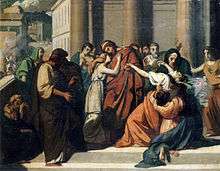Jocasta complex
In psychoanalytic theory, the Jocasta complex is the incestuous sexual desire of a mother towards her son.[1]

Raymond de Saussure introduced the term in 1920 by way of analogy to its logical converse in psychoanalysis, the Oedipus complex, and it may be used to cover different degrees of attachment,[2] including domineering but asexual mother love – something perhaps particularly prevalent with an absent father.
Origins
The Jocasta complex is named for Jocasta, a Greek queen who unwittingly married her son, Oedipus. The Jocasta complex is similar to the Oedipus complex, in which a child has sexual desire towards their parent(s). The term is a bit of an extrapolation, since in the original story Oedipus and Jocasta were unaware that they were mother and son when they married. The usage in modern contexts involves a son with full knowledge of who his mother is.
Analytic discussion
Theodor Reik saw the "Jocasta mother", with an unfulfilled adult relationship of her own and an over-concern for her child instead, as a prime source of neurosis.[3]
George Devereux went further, arguing that the child's Oedipal complex was itself triggered by a pre-existing parental complex (Jocasta/Laius).[4]
Eric Berne also explored the other (parental) side of the Oedipus complex, pointing to related family dramas such as "mother sleeping with daughter's boyfriend ... when mother has no son to play Jocasta with".[5]
Cultural analogues
- Atossa, in the Greek tragedy The Persians, has been seen as struggling in her dreams with a Jocasta complex.[6]
- Indian folk-tales often feature figures, like Jocasta, expressing maternal desire for their sons.[7]
See also
References
- Jon E. Roeckelein. Elsevier's dictionary of psychological theories. Elsevier, 2006. ISBN 0-444-51750-2. Page 112
- R. J. Campbell, Campbell's Psychiatric Dictionary (2009) p. 534
- Stuart Sutherland, Breakdown (Oxford 1998) p. 156
- George Devereux, Dreams in Greek Tragedy (1976) pp. 209–10
- Eric Berne, What Do You Say After You Say Hello? (1974) p. 52
- George Devereux, Dreams in Greek Tragedy (1976) p. 17
- L. Edmunds/A. Dundes, Oedipus: A Folklore Casebook (1995) p. 255
Further reading
- Matthew Besdine, "The Jocasta Complex, Mothering and Genius", Psychoanalytic Review 55 (1968), 259–77
- Christiane Olivier, Jocasta's Children: The Impact of the Mother (1989)